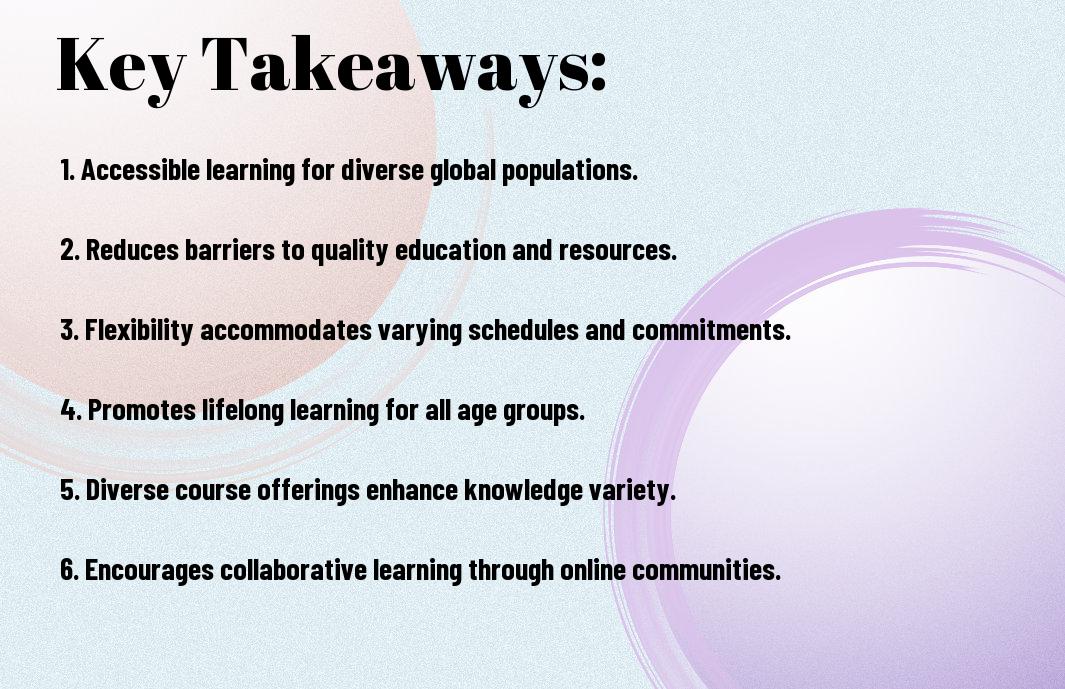
Key Takeaways:
- The availability of online education has made it possible for people from all over the world to access quality educational resources, regardless of their geographical location or financial situation.
- Flexible learning options, such as online courses and degree programs, have enabled students to balance their academic pursuits with work and other responsibilities, making it easier for them to pursue higher education.
- Online education has bridged the gap between different socio-economic groups, providing equal access to knowledge and skills that were previously only available to a select few.
- The digital platforms used in online education have also enabled personalized learning experiences, allowing students to learn at their own pace and focus on areas where they need improvement.
- Overall, online education has democratized knowledge by making it more accessible and affordable, and has the potential to transform the way we learn and acquire new skills in the future.
The Digital Revolution in Learning
For your educational journey, the digital revolution has opened up new avenues, enabling you to access a vast array of courses and resources from anywhere in the world.
Accessibility and Reach
Around the globe, online education is transforming the way you learn, making it possible for you to acquire new skills and knowledge at your own pace.
Breaking Geographical Barriers
Bridging the gap between traditional classroom settings and online learning, you can now access educational resources from institutions worldwide, regardless of your location.
It is interesting to note that as you explore online education, you will find that geographical barriers no longer limit your access to top-notch educational institutions, allowing you to choose from a wide range of programs tailored to your interests and career goals.

Democratization of Knowledge
You can access knowledge from anywhere, thanks to online education, as seen in Democratizing digital learning: theorizing the fully online learning environment, which discusses the benefits of online learning.
Equal Opportunities for All
Betwixt the various benefits of online education, you’ll find that it provides equal opportunities for all, regardless of your geographical location or financial background, to access quality educational resources.
Challenges in Equity and Access
Opportunity gaps still exist, and you may face challenges in accessing online education due to factors like internet connectivity and device availability, which can hinder your ability to fully participate.
Even with the benefits of online education, you may still encounter challenges in equity and access, such as digital literacy and language barriers, which can affect your ability to navigate online platforms and access educational resources, highlighting the need for inclusive and supportive online learning environments that address these issues.
The Role of Technology
Not only has technology bridged the gap between knowledge and accessibility, but it has also enabled you to access information from anywhere in the world. You can learn more about how technology is changing the education landscape by visiting How Edtech is democratizing education – Times of India, which provides valuable insights into the impact of edtech on education.
Platforms and Tools
Against the backdrop of traditional learning methods, you will find that online platforms and tools are revolutionizing the way you learn, making it more engaging and interactive, and allowing you to access a wide range of courses and resources.
Innovations in Online Teaching
To stay ahead of the curve, you need to be aware of the latest innovations in online teaching, such as virtual reality, artificial intelligence, and gamification, which are transforming the online learning experience and making it more immersive and effective.
Consequently, as you explore these innovations, you will discover that they are not only enhancing your learning experience but also providing you with personalized learning paths, real-time feedback, and access to a global community of learners, enabling you to learn at your own pace and achieve your academic goals more efficiently.
Personalized Learning Experiences
Many online education platforms offer tailored learning experiences, allowing you to learn at your own pace and focus on areas that interest you the most. This approach enables you to take ownership of your learning journey, making it more effective and enjoyable.
Adaptive Technologies
Contrary to traditional teaching methods, adaptive technologies in online education adjust to your learning style, providing real-time feedback and assessment. This helps you identify areas where you need improvement, enabling you to adjust your learning strategy accordingly.
Student-Centered Approaches
Alongside the benefits of personalized learning, you’ll find that student-centered approaches prioritize your needs and goals, making learning more engaging and relevant to your life. This approach fosters a deeper understanding of the subject matter, as you’re able to relate it to your own experiences and interests.
Considering the student-centered approaches in online education, you can explore various subjects and topics in a way that resonates with you. You’ll have the autonomy to choose from a wide range of courses, instructors, and learning materials, allowing you to create a learning pathway that suits your preferences and career aspirations. As you progress, you’ll be able to reflect on your learning, identifying what works best for you and making adjustments to optimize your educational experience.
Societal Impact and Future Prospects
After witnessing the rise of online education, you can see its impact on society. You can learn more about the Democratisation of knowledge through open-access resources and online education and its effects on your community.
Economic Implications
Betwixt the benefits of online education, you will find that it can also have economic implications, affecting your wallet and your access to knowledge, as you invest in your future.
Global Connectivity and Collaboration
The opportunity to connect with others worldwide is now at your fingertips, allowing you to collaborate and learn from people with different backgrounds and perspectives, broadening your understanding of the world.
As you explore global connectivity and collaboration, you will discover that it enables you to access a vast array of resources, expertise, and experiences, helping you to develop a more nuanced and informed worldview, and preparing you to succeed in an increasingly interconnected world, where your ability to collaborate and adapt will be crucial to your success.
Challenges and Considerations
Despite the numerous benefits of online education, you will encounter several challenges that need to be addressed. As you navigate the online learning landscape, you must consider the potential drawbacks and limitations of this approach.
Quality Assurance
Accordingly, you should prioritize quality assurance when selecting online courses or programs, ensuring that they meet your standards and needs. You can do this by researching the institution, reading reviews, and checking accreditation.
Digital Divide and Inclusion
By exploring the issue of digital divide and inclusion, you will realize that not everyone has equal access to online education. You may notice that some individuals or groups lack the necessary technology, internet connectivity, or digital literacy to participate in online learning.
Understanding the digital divide and its impact on inclusion is necessary for you to appreciate the complexities of online education. As you explore deeper into this issue, you will discover that it affects not only individuals but also communities and societies as a whole, perpetuating existing inequalities and hindering social mobility, and you should consider how online education can be made more accessible and inclusive for all.
To wrap up
Drawing together the various threads, you can see how online education is bridging gaps in access to knowledge, allowing you to learn from anywhere and at your own pace. As you explore the vast array of online courses and resources, you’ll find that your learning experience is enhanced, and your understanding of the world is broadened, enabling you to make informed decisions and stay ahead in your field, ultimately empowering you to take control of your educational journey.
FAQ
Q: What is the impact of online education on accessibility of knowledge?
A: Online education has revolutionized the way people access knowledge by making it more accessible and affordable. With the rise of online courses, degree programs, and educational resources, individuals from all over the world can now access high-quality educational content from top institutions and experts, regardless of their geographical location or financial background. This has leveled the playing field, enabling people from diverse backgrounds to acquire knowledge and skills that were previously out of reach.
Q: How is online education bridging the gap between different socio-economic groups?
A: Online education is bridging the gap between different socio-economic groups by providing equal opportunities for learning and skill development. Online courses and degree programs are often priced lower than traditional offline programs, making them more affordable for people from low-income backgrounds. Additionally, online education platforms often offer scholarships, financial aid, and flexible payment options, further increasing accessibility. This has enabled people from disadvantaged backgrounds to acquire knowledge and skills that can help them improve their socio-economic status and compete with their peers from more affluent backgrounds.
Q: What role is technology playing in democratizing knowledge through online education?
A: Technology is playing a vital role in democratizing knowledge through online education by providing the infrastructure and tools necessary for online learning. Advances in digital technology have enabled the creation of interactive and engaging online courses, virtual classrooms, and online communities, making online learning a more immersive and effective experience. Moreover, technology has also enabled the development of adaptive learning systems, artificial intelligence-powered tutoring, and data analytics, which help personalize the learning experience and improve student outcomes. Overall, technology has been instrumental in making online education a viable and effective means of knowledge acquisition, thereby democratizing access to knowledge and education.

